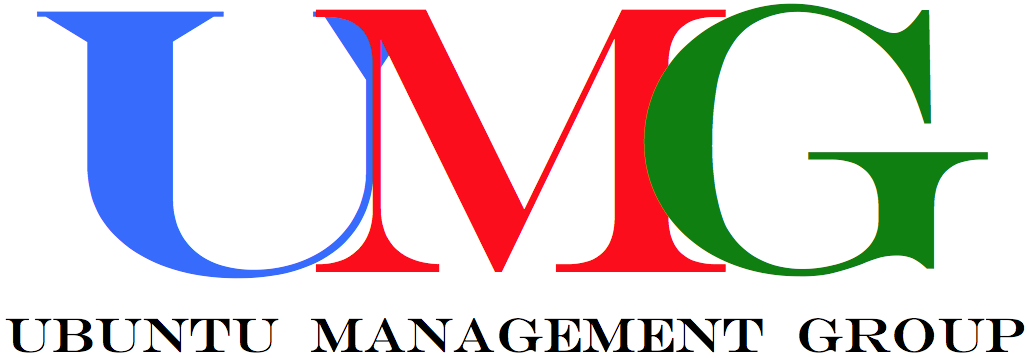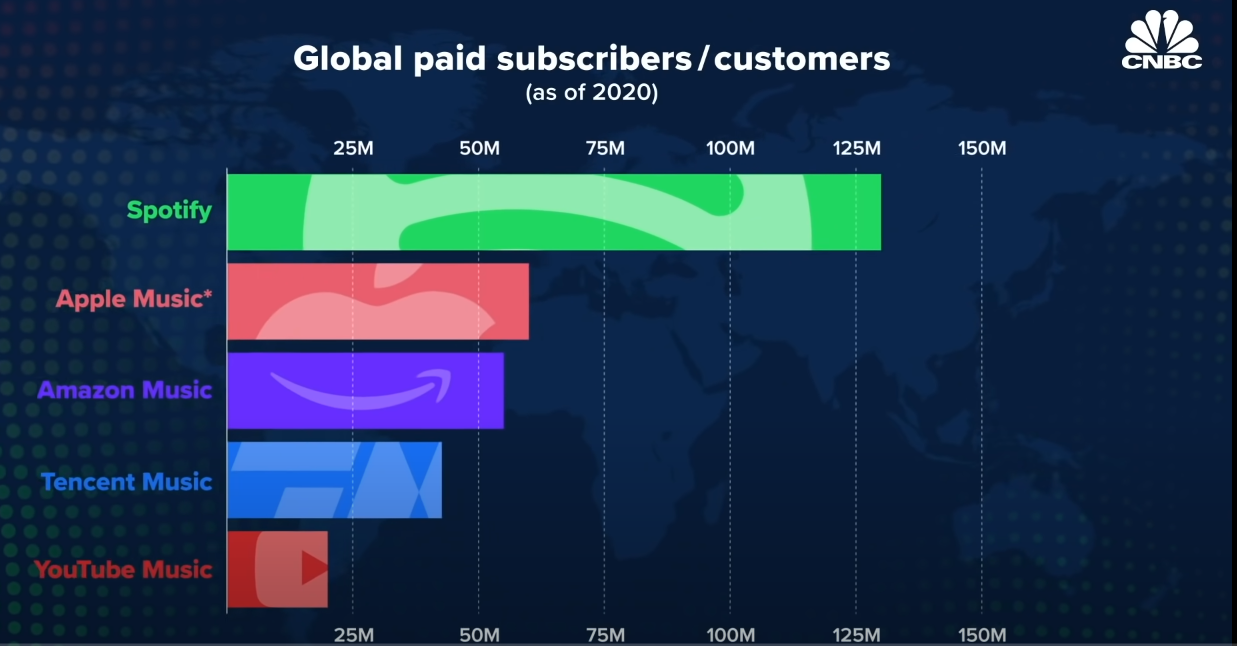Bruce Ironhardt writes, “It’s hard to fight off giants.”
Let’s make no mistake. Spotify is a giant when it comes to the music streaming business. The software is intuitive, easy to use, and available on a large variety of devices.
More importantly, when it comes to paid subscribers Spotify eclipses tech giants like Amazon, Google, and even Apple. This is a huge feat especially for a company as small as Spotify, because while it may be a giant in the music streaming business.
Now look Spotify is THE market leader when it comes to music streaming and they continue to have a massive amount of success with consumers but… they still aren’t profitable. And that’s a huge problem when you’re a business with the biggest market share.
So why is it struggling to stay alive? The short answer is that it’s being bullied by other competitors and the industry is simply too expensive.
Before we get into the nitty-gritty of why Spotify is struggling it’s important to understand how it got to where it is today and why it dominates the current market.
The Rise of The Small Swedish Company
Founded in 2006 by Daniel Ek and Martin Lorentzon, Spotify was the Swedish answer to digital piracy.
Before Spotify, digital privacy was rampant, and services like Napster or Limewire made it easy for people to download their favorite songs for free. Apple, at this time, also had iTunes which allowed consumers to purchase songs for 99 cents a song.
But Daniel Ek saw an opportunity to capitalize on the market and so the online streaming service was born. Ek’s goal was to make the platform as easy to use as possible. Here’s a quote by the CEO describing his thought process of what Spotify needed to be,
“The only way to solve the problem was to create a service that was better than piracy and at the same time compensates the music industry.” — Daniel Elk
But despite the brilliant idea, Spotify had a few struggles early on.
In order to get the rights to stream songs, it needed to convince European labels to get on board. It took Ek almost 2 years but he was able to convince record labels to get on board and the company was finally able to launch in European markets. After a few years of success the companies next goal was the United States.
Ek was later able to get some of the largest licensing partners on board in the US markets like Sony Music, Merlin, Warner, and Universal Music Group. After that, it only took a little longer for Spotify to enter the US market and really start to dominate the space. They were one of the first companies to have a music streaming service in the market and consumers loved it. But that doesn't mean Spotify didn't deal with a lot of issues. But we’ll get into that a little more later.
Why Spotify Can Go Toe-to-Toe With Titans
Well, it helps (a ton) that Spotify really was first to the game. It got a huge head start when compared to everyone else and that meant a loyal customer base. But that isn’t the whole story. People still choose to subscribe to Spotify over Apple Music or YouTube Music to this very day despite all these services almost being the same, with similar catalogs.
This is because they do a lot of other things well.
The first huge sell for Spotify is that it’s free.
If you’re someone like me who came from downloading pirated music all the time in the early 2000s as a kid, you really weren’t fond of paying for the music (even though its the right thing to do).
But Spotify’s free tier seemed like the perfect balance. Access to an almost unlimited library but you get an ad here or there, not too bad eh?
But here’s the thing.
Spotify made their free tier just annoying enough. It wasn't too annoying that you would stop using it but you did lose out on features like high-quality audio, downloading music offline (which is huge for those without good data plans), and of course not having ads.
This meant that you're highly likely to “try” their free-trial and once you do, you never go back because of how much better the experience is.
This strategy is how I think Spotify was able to get so many more users.
Spotify has a conversion rate of around 46%, meaning that free about 46% of free users end up becoming paid subscribers to the platform. They have over 100 million paid subscribers currently but over 200 million free users.
The Verge
Besides that strategy though, they just have an awesome service.
On the surface, they aren’t terribly different from their competitors but where they dominate is with AI and integration with others.
Spotify makes it easy for you to use its service on everything from a smartwatch or smart speaker to a car. This makes it huge for people who aren’t tied to a single ecosystem. People can see what I’m listening to on Discord and with integration from Facebook, it’s easy to see all the songs your friends listen to.
Their AI is also very good at making recommendations (anecdotal). They’re “Daily Mixes” makes it easy to listen to your favorite songs while still adding new fresh ones to keep things interesting. These supporting services make Spotify a stronger service.
How Spotify is getting backed into a corner
Spotify is getting hit from all sides and their business really is struggling to make and keep a profit. According to an annual report from 2018,
SEC — UNITED STATES SECURITIES AND EXCHANGE COMMISSION
Essentially Spotify spends A LOT of money to license content (about 10 billion since it started) and that’s important to note because despite that artists are still not getting paid as much as they should.
There have been a few high profile artists, like Taylor Swift, who’ve spoken up about how little Spotify ends up paying its artists. This has generated huge controversies for the company and Taylor Swift even removed her songs from the platform for a period of time. Controversies like this can make consumers think twice about what service they want to support and die-hard fans of certain celebrities could leave the platform.
However, despite Spotify not being able to turn a profit or pay its artists enough money, Spotify actually has a bigger threat… Google, Amazon, and especially Apple.
Unlike these 3 giants, Spotify doesn’t own a major operating system to run its app. At the end of the day, it’s just another app and this means it needs to compete against other apps.
Who’s the competition? Right, the owners of the operating systems that Spotify runs on, namely Apple and Google.
Assuming Apple and Google have the same troubles Spotify has with a total cost exceeding revenue, Spotify is put at a huge disadvantage. All these companies offer essentially a very similar service for about the same price but unlike Spotify, they also own the platforms that they run on. That means they don’t pay the same app tax that Apple or Google pays when operating on iOS or Android.
This means that if Spotify got a new customer on say iOS, Spotify would have to pay 30% of the subscription cost to Apple each month for a year and then 15% thereafter. Basically, that means that Apple and Google both make about 15–30% more on a certain subset of customers when compared to Spotify making the game a little unfair for them.
Because all these companies price at about the same price the industry standard is set at about 9.99/month. If Spotify pushed the tax onto consumers they’d break the industry standard and wouldn’t be able to compete as well. This puts them in a bit of an awkward position.
The other issue for Spotify is Apple’s push to being more focused on services.
The newly announced Apple One which offers Apple Music, Apple TV+, Apple Arcade, and 50GB of iCloud for 15.99 /month. Now obviously for anyone who just wants music this service isn’t a huge deal for Spotify but for a smaller subset of people that may want any one of these services, Spotify no longer seems worth it and Apple service becomes a more compelling platform.
But it isn’t just that. The real struggle with Spotify is with making money. Spotify whose entire business is based on music streaming is functionally different from its competitors. Apple, Google, and Amazon can afford to operate at loss by funding the venture through other income streams. Spotify can’t. And as these companies start combining more and more services with their music streaming business, Spotify gets less and less compelling.
What Spotify Can Do To Win
It should continue to do what its currently doing. Invest in research, build a better platform, and get customers excited about the service.
Recently, Spotify has made a small pivot, instead of focusing on just music they now focus on audio. That means focusing on other aspects of the listening experience like Podcasts.
The recent Joe Rogan acquisition is huge for them and will help cement them when it comes to having a selection of high-quality podcasts.
Beyond that, however, they’ll need to eventually lean out and dip their toes into other businesses that can help them with their core business.
The biggest thing I can think of is starting their own record label and producing their own content. I know telling every company to emulate Netflix is getting a little uncreative but when the shoe fits it fits.
Spotify can continue to license songs from other labels but they need to have something that’s exclusive to their own platform. The Joe Rogan acquisition was a great first step but if they can get big artists to join their label and host their content exclusively or for a period of time, it could be a major win for Spotify.
Artists and celebrities have to die-hard fans. If you can get them on an already popular platform exclusively you increase the inherent value of the platform as a whole.
Fitness is another major market that Spotify should seriously look into. They’ll need to compete with Apple and Fitness+ but if they can integrate Fitness into their current service it could help differentiate them further and push them further.
Whatever they end up doing though, they need to focus on the value proposition that they bring to the table. People want more for less and most consumers aren’t going to want to pay for Spotify if they already pay for Apple One or Youtube Premium.





